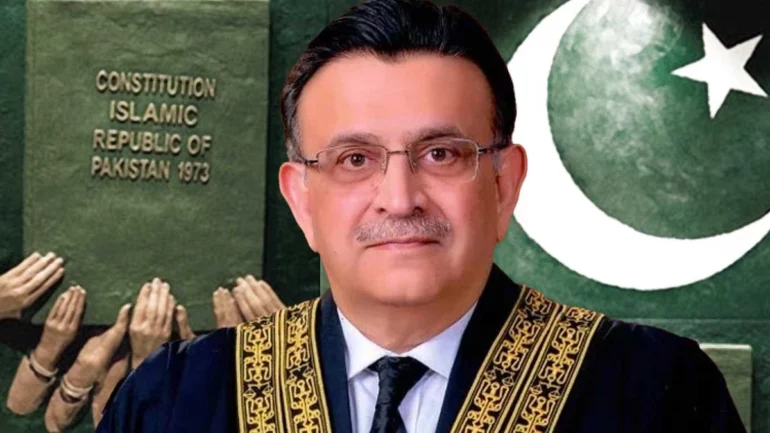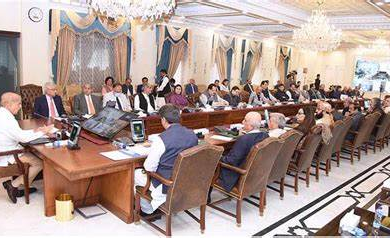Three-member bench of the Supreme Court hearing the Pakistan Tehreek-e-Insaf’s (PTI) petition against the Election Commission of Pakistan’s decision to delay polls in Punjab has reserved its judgment which will be announced on Tuesday.
Arguments of all the stakeholders were heard by the three-member bench headed by Chief Justice Umar Ata Bandial. Justice Munib Akhtar and Justice Ijaz ul Ahsan were also part of the original five-member bench was later relegated to three-member after recusal of two judges including Justices Jamal Khan Mandokhail and Aminuddin Khan.
Earlier, the top court ruled on March 1 to hold the election in Khyber Pakhtunkhwa and Punjab within 90 days.
The coalition parties earlier in the day submitted an application in the Supreme Court through the Attorney General for Pakistan (AGP), requesting a full court to hear the case. It also sought the dismissal of the PTI petition in the light of what it interpreted as a “4-3” order issued by the apex court on March 1.
However, the CJP rejected the government’s request for a full court and instead suggested that a larger bench could be sought.
During the hearing today, the secretaries of the finance and defence ministries briefed the court and submitted their respective reports.
AGP Awan, ECP lawyers Irfan Qadir and Sajeel Swati, PTI lawyer Ali Zafar, and PPP counsel Farooq H. Naek were present in the courtroom as the hearing commenced today.
The secretaries of finance and interior ministries were also in attendance.
At the outset of the hearing, Naek came to the rostrum. Justice Bandial asked the lawyer if PPP had ended its boycott against the court hearing to which the latter replied that he had not boycotted the proceedings.
Justice Akhtar wonder how could he (Naek) attend the court if they had boycotted the hearing. “For the last 48 hours, the media has been saying that political parties have expressed no confidence in the bench.”
He asked how would he present his arguments if they did not have confidence in the three-member bench.
The justice said the court would only hear Naek if he withdrew the statement — jointly issued by coalition leaders last week expressing “complete no-confidence” in the bench.
Justice Akhtar also asked Naek to read out the joint statement and expressed displeasure at the language used in it.
Here, the CJP asked the PPP lawyer if he wanted to become a part of the proceedings, to which Naek replied in the affirmative and said that “we never boycotted the hearing”.
“But something else was written in the newspapers,” Justice Bandial highlighted. Naek replied that his party had reservations on the maintainability of the petition.
However, the CJP insisted that Naek confirmed in writing that he had not boycotted the hearing.
Turning to the AGP, Justice Bandial then inquired about the directions he had received, to which Awan replied that the government worked under the Constitution and could not boycott the proceedings.
Subsequently, AGP highlighted that the PTI petition was based on the SC’s March 1 verdict, in which the apex court had instructed the president to select a date for elections in Punjab and the governor to pick a date for polls in KP.
“But the KP governor never selected a date until the petition was filed,” he pointed out.
“The question is how can the ECP give the date of Oct 8 for polls,” the CJP said here. “The law gives no one the authority to delay elections. Only the court can delay the date for polls.”
Justice Ahsan observed that the actual matter under consideration was the ECP’s decision to postpone elections, noting that the commission was bound to follow the court orders.
AGP Awan recalled that during the first round of the hearings — the court’s suo motu proceedings on elections in Punjab and KP — a nine-member bench had conducted the proceedings.
“On Feb 21, we received the order of the court which included dissenting notes from two judges. The two judges had dismissed the case in the first hearing,” he said.
However, the CJP interjected and said that only one judge had dismissed the proceedings. “Justice Athar Minallah had not mentioned rejecting the request in his dissenting note,” he said.
“Justice Yahya Afridi had agreed with Justice Minallah in his note,” the AGP argued to which Justice Bandial stated that the court had understood Awan’s stance.
Justice Akhtar recalled that on February 27, a nine-member bench had forwarded the matter to the CJP for the reconstitution of the bench with Justice Ahsan adding that when the bench was reconstituted it consisted of five judges.
Meanwhile, the CJP clarified that he was not obligated to select the previous members and pointed out that the order the AGP was referring to was a minority judgement.
For his part, the AGP argued that an order of the court was not issued on March 1 to which Justice Bandial asked if Awan believed that a five-member bench was never constituted.
Justice Bandial pointed out that the detailed dissenting notes of the judges did not include any points about the reconstitution of the bench.
Here, the AGP — while quoting the notes — stated that the bench’s reformation was an administrative move, and Justices Ahsan and Mazahar Ali Akbar Naqvi had distanced themselves from the suo motu hearing.
The CJP clarified that four judges had recused themselves from the bench, adding that it would have been more accurate to mention in the note that they were removed from the bench.
Justice Bandial pointed out that the note did not specify which judges had voluntarily separated from the bench, adding that when a judge wanted to withdraw a bench, they had to submit a judicial note.
“There is no doubt in the fact that a judge can’t be thrown out of a bench,” he stated, adding that when the court ordered the reconstitution of a bench, it did not mean that other judges were being removed from the bench.
Justice Ahsan said here that forming a new bench was a judicial directive and not an administrative one.
Justice Akhtar also pointed out that the absence of the two judges was not brought up during the two-day suo motu hearing conducted by the five-member bench.
The CJP stated that a new bench was formed and the hearing began again.
He further stated that the AGP had not succeeded in convincing the court to separate the judges who previously heard the case from the current bench.
The AGP also cited a circular issued by the SC registrar’s office in response to a judgement issued by Justice Qazi Faez Isa and Justice Khan on March 29.
Referring to the circular during the hearing today, AGP Awan argued that a judicial order or judgment could not be overruled by an administrative circular to which the CJP replied that the circular did not overrule any decisions.
He clarified that the circular had instead issued administrative instructions for the judgement. Justice Bandial went on to mention another circular that halted proceedings for cases under Article 184(3) of the Constitution and clarified that the circular did not violate the decision of the five-member bench.
“There were no clear directives in the order issued by Justice Isa,” Justice Bandial added.
The AGP argued that rules regarding petitions were present in Article 184(3) of the Constitution and there was a five-member SC verdict available too on the mechanism of suo motu cases.
At that, the CJP said: “In the verdict, it is written that it would be better to stop the hearing of cases on 184(3). In the March 29 verdict, there was no directive rather a wish was expressed.
“Decisions on cases have to be taken in favour of the public, not by adjourning the hearing,” he stressed.
For his part, Qadir said that stopping hearings of cases in high courts was not according to the Constitution.
He further said that the KP governor had issued a date for polls in the province and contended that the SC’s order regarding the president giving the date for elections was not as per the law. “The president cannot take any decision independently [regarding elections].
“The order given to him regarding giving a date for elections was unconstitutional,” he contended, adding that the president was bound by the cabinet’s advice in all matters.
“As per the Election Act, the president only has authority when it comes to the general elections,” the ECP lawyer said, adding that general elections will be held throughout the country at the same time.
He again reminded the court that Justice Isa’s decision had stopped the hearing of all the cases under Article 184(3) of the Constitution.
Addressing the CJP, Qadir stated that the top judge was currently trending on social media and that petitions were being signed in the favour of Justice Bandial.
“We turn to God for our well-being,” the CJP replied.
At that, Qadir requested the top judge to solve the internal matters of the court. He also said that until the conflict on Article 184(3) of the Constitution was resolved, all suo motu hearings should be stopped. “Justice Qazi Faez Isa is a senior judge and his judgement cannot be ignored,” he added.
Here, the CJP revealed on matters highlighted above, all the judges would soon meet. He said that had met Justice Isa recently and some issues were highlighted during the meeting.
“We will soon call a full court meeting would soon be called to make the rules,” he added.



